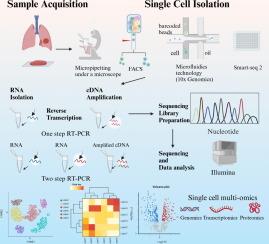Applications of single-cell analysis in immunotherapy for lung cancer: Current progress, new challenges and expectations
IF 11.4
1区 综合性期刊
Q1 MULTIDISCIPLINARY SCIENCES
引用次数: 0
Abstract
Background
Lung cancer is a prevalent form of cancer worldwide, presenting a substantial risk to human well-being. Lung cancer is classified into two main types: non-small cell lung cancer (NSCLC) and small cell lung cancer (SCLC). The advancement of tumor immunotherapy, specifically immune checkpoint inhibitors and adaptive T-cell therapy, has encountered substantial obstacles due to the rapid progression of SCLC and the metastasis, recurrence, and drug resistance of NSCLC. These challenges are believed to stem from the tumor heterogeneity of lung cancer within the tumor microenvironment.Aim of review
This review aims to comprehensively explore recent strides in single-cell analysis, a robust sequencing technology, concerning its application in the realm of tumor immunotherapy for lung cancer. It has been effectively integrated with transcriptomics, epigenomics, genomics, and proteomics for various applications. Specifically, these techniques have proven valuable in mapping the transcriptional activity of tumor-infiltrating lymphocytes in patients with NSCLC, identifying circulating tumor cells, and elucidating the heterogeneity of the tumor microenvironment.Key scientific concepts of review
The review emphasizes the paramount significance of single-cell analysis in mapping the immune cells within NSCLC patients, unveiling circulating tumor cells, and elucidating the tumor microenvironment heterogeneity. Notably, these advancements highlight the potential of single-cell analysis to revolutionize lung cancer immunotherapy by characterizing immune cell fates, improving therapeutic strategies, and identifying promising targets or prognostic biomarkers. Its potential to unravel the complexities within the tumor microenvironment and enhance treatment strategies marks a significant step towards more effective therapies and improved patient outcomes.

单细胞分析在肺癌免疫疗法中的应用:当前进展、新挑战和新期望
背景肺癌是全球普遍存在的一种癌症,对人类健康构成重大威胁。肺癌主要分为两种类型:非小细胞肺癌(NSCLC)和小细胞肺癌(SCLC)。肿瘤免疫疗法,特别是免疫检查点抑制剂和适应性 T 细胞疗法的发展遇到了巨大障碍,因为 SCLC 进展迅速,而 NSCLC 则存在转移、复发和耐药性。本综述旨在全面探讨单细胞分析(一种强大的测序技术)在肺癌肿瘤免疫疗法领域应用的最新进展。单细胞分析已与转录组学、表观基因组学、基因组学和蛋白质组学有效结合,应用于各种领域。本综述强调了单细胞分析在绘制 NSCLC 患者体内免疫细胞图、揭示循环肿瘤细胞和阐明肿瘤微环境异质性方面的重要意义。值得注意的是,这些进展凸显了单细胞分析在通过描述免疫细胞的命运、改进治疗策略以及确定有前景的靶点或预后生物标志物来彻底改变肺癌免疫疗法方面的潜力。它在揭示肿瘤微环境的复杂性和改进治疗策略方面的潜力标志着向更有效的疗法和改善患者预后迈出了重要一步。
本文章由计算机程序翻译,如有差异,请以英文原文为准。
求助全文
约1分钟内获得全文
求助全文
来源期刊

Journal of Advanced Research
Multidisciplinary-Multidisciplinary
CiteScore
21.60
自引率
0.90%
发文量
280
审稿时长
12 weeks
期刊介绍:
Journal of Advanced Research (J. Adv. Res.) is an applied/natural sciences, peer-reviewed journal that focuses on interdisciplinary research. The journal aims to contribute to applied research and knowledge worldwide through the publication of original and high-quality research articles in the fields of Medicine, Pharmaceutical Sciences, Dentistry, Physical Therapy, Veterinary Medicine, and Basic and Biological Sciences.
The following abstracting and indexing services cover the Journal of Advanced Research: PubMed/Medline, Essential Science Indicators, Web of Science, Scopus, PubMed Central, PubMed, Science Citation Index Expanded, Directory of Open Access Journals (DOAJ), and INSPEC.
 求助内容:
求助内容: 应助结果提醒方式:
应助结果提醒方式:


